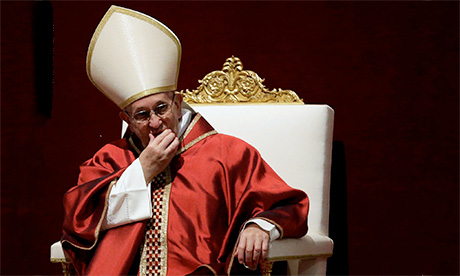The Vatican felt obliged this week to reaffirm that Pope Francis believes in a central tenet of Catholicism, that there is a hell.
That odd declaration came after the newspaper La Repubblica published a front-page article on Thursday by an atheist, left-wing and anticlerical giant of Italian journalism, who reported that during a recent meeting the pope had said that hell did not exist.
Bad souls are “not punished,” the journalist, Eugenio Scalfari, 93, reported the pope as saying. “A hell doesn’t exist.”
Nor, for Mr Scalfari, does a tape recorder or notebook or the orthodoxy of quotation marks.
The Vatican characterized the remarks as misquotations.
In the past, Mr Scalfari, the founder of La Repubblica, a bible of the Italian left that he edited for decades, has admitted to sometimes putting words in the papal mouth.
But the infernal remarks, especially as the pope prepared for Easter Sunday celebrations, proved too tempting for international tabloids, conservative websites antagonistic to the pope and many others to let go.
“Pope Declares No Hell,” read a screaming headline across the Drudge Report website.
“Does the Pope Believe in Hell?” asked Patrick J Buchanan in an online column.
“Vatican literally falls apart after Pope Francis says ‘Hell doesn’t exist,’” read a headline in Metro UK, a British newspaper.
The pope, in fact, has often talked about hell as a very real final destination for the wicked, and the Vatican made clear that the “literal words pronounced by the pope are not quoted” and that “no quotation of the article should be considered as a faithful transcription of the words of the Holy Father.”
Mr Scalfari agreed.
“They are perfectly right,” said Mr Scalfari in an interview on Friday night, as the pope prepared for a ceremonial leading of the stations of the cross on Good Friday. “These are not interviews, these are meetings, I don’t take notes. It’s a chat.”
While Mr Scalfari said he remembered the pope saying hell did not exist, he allowed that “I can also make mistakes.”
He said he had committed an error of omission by failing to fully explain the pope’s answer on the need for a stronger Europe.
“At my age,” Mr Scalfari said, he was more used to being interviewed than interviewing.
The editor of La Repubblica, Mario Calabresi, said the paper had not labeled Mr Scalfari’s piece as an interview.
It was, Mr Calabresi said, the fruit of a “cultural exchange and dialogue out of the 19th century between a Jesuit believer and a man of the enlightenment fascinated by religion.”
Sophisticated readers of Italian journalism understand how to read Mr Scalfari, which is to say, with a grain of salt when it comes to papal quotations.
To many here, Mr Scalfari personifies an impressionistic style of Italian journalism, prevalent in its coverage of the Vatican, politics and much else, in which the gist is more important than the verbatim, and the spirit greater than the letter.
And yet, despite the public relations headaches Mr Scalfari has caused, Francis, 81, seems to like talking to him.
The pope, Mr Scalfari said, has a “need to talk with a nonbeliever who stimulates him.” This month’s meeting was their fifth. Continue reading
- Image: NYT
News category: Features.




